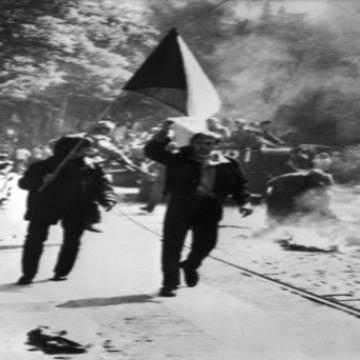Around 1968: Activism, Networks, Trajectories
This Project is now complete
A failed political revolution that led to an enduring cultural revolution? A disastrous attack on ethical values in the name of drugs, free love and violence? The events of 1968 in cities across Europe have been represented in sharply contrasting narratives.
Funded by a major grant from the AHRC, a project based in Oxford’s Modern European History Research Centre (MEHRC) is considering 1968 as a historic moment between postwar austerity and the Thatcher-Reagan years. Its guiding themes are transnationalism and subjectivity: tracing the links between activists in different parts of Europe and collecting oral testimony which both models and subverts existing narratives.
Further information can be found on our website: https://around1968.history.ox.ac.uk/


Funded by a major grant from the AHRC, a project based in Oxford’s Modern European History Research Centre (MEHRC) considered 1968 as a historic moment between postwar austerity and the Thatcher-Reagan years. Its guiding themes were transnationalism and subjectivity: tracing the links between activists in different parts of Europe and collecting oral testimony which both models and subverts existing narratives.
Histories of 1968 have hitherto concentrated on the epicentres of revolt in the democracies of France, West Germany and Italy, together with the United States. This project explored activism not only in the democracies (including Great Britain and Northern Ireland, Denmark and the Netherlands) but also in the dictatorships of southern Europe (Franco’s Spain, the Greece of the Colonels) and in the Communist dictatorships beyond the Iron Curtain (the GDR, Poland, Czechoslovakia, Hungary and the USSR). It examined whether there was a common European ’68 or conflicting experiences, misunderstandings and time-lags between radical activity in different parts of Europe, and explored transnational links between European activists.
Conventionally, thinking about 1968 has been subsumed under one of two ‘grand narratives’: one that activism progressed from the political to the cultural, the other that it moved from youth culture to politics, from hedonism to Leninism. In this project the unit of analysis was the network as spun by activists engaged in a variety of forms of activism: political, religious and those experimenting with artistic forms and alternative forms of living; violent and non-violent; tackling questions of gender and the relationship between intellectuals and workers. The project conducted life-history interviews with former activists belonging to these networks in order to explore how far their accounts reflected the dominant narratives and how far they challenged and subverted familiar stories.
The project was undertaken by an International team of historians fourteen strong. These were:
- Rebecca Clifford, Lecturer in History, University of Swansea, working on Italy
- John Davis, Fellow and Praelector in Modern History and Politics and Lecturer in History, University of Oxford, working on England;
- Juliane Fürst, Lecturer in History, University of Bristol, working on the Soviet Union;
- Robert Gildea, Professor of Modern History, University of Oxford, working on France;
- Gudni Jóhannesson, Associate professor, school of law & school of business, Reykjavik University, working on Iceland;
- Anna-Maria Menge, Junior Research Fellow, Magdalen College, University of Oxford, working on the two Germanies;
- James Mark, Lecturer in History, University of Exeter, working on Hungary;
- Piotr Oseka, Associate Professor, Institute of Political Studies, Polish Academy of Sciences, working on Poland
- Niek Pas, Professor of Media and Culture, University of Amsterdam, working on the Netherlands;
- Chris Reynolds, Lecturer in French and European Studies, Nottingham Trent University, working on Northern Ireland;
- Nigel Townson, Senior Lecturer in History, Faculty of Sociology and Political Science, Universidad Complutense de Madrid, working on Spain;
- Oldřich Tuma, Professor and Director of the Institute for Contemporary History, Academy of Sciences of the Czech Republic, working on Czechoslovakia; ,
- Polymeris Voglis, Lecturer in History, University of Thessaly, working on Greece; and
- Anette Warring, Professor of History, Department of History and Social Theory, University of Roskilde, working on Denmark.
The project benefited hugely from the advice of Professor Shelia Rowbotham, Professor of Sociology at the University of Manchester, former activist and acclaimed author of Promise of a Dream (2000).
The researchers met in three annual workshops, separately funded by the Leverhulme Trust – Oxford in 2007, Roskilde in 2008 and Prague in 2009. A fourth workshop took place in Madrid in 2010. The project is publishing a series of articles in a special number of Cultural and Social History and will bring out a book, with Oxford University Press, revolving around the themes of becoming an activist, being an activist, and making sense of activism.
A major legacy of the project is a database of activists and networks containing the sound files of several hundred interviews, transcriptions and (funding permitting) translations. These will be available to future historians of 1968 via the MDID archive system.



